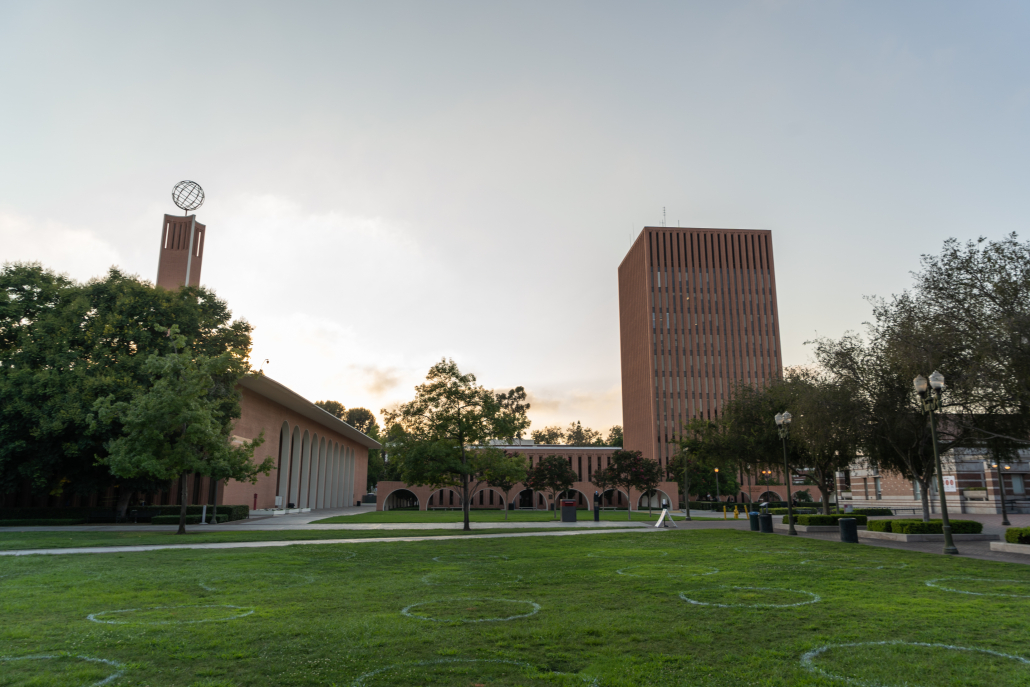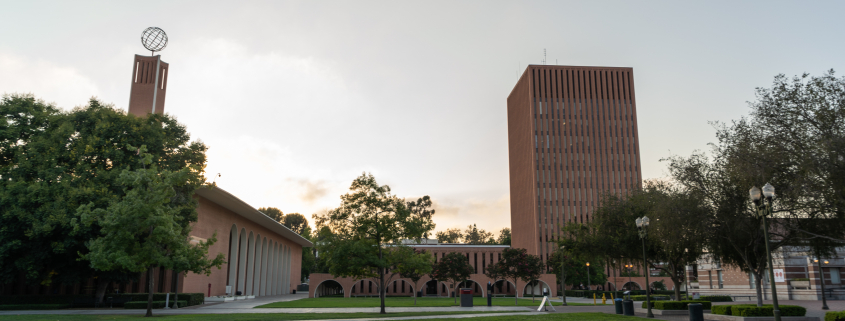Ukrainian students discuss invasion

Uliana Kolysnichenko was having dinner and making plans to go to the beach with friends Sunday evening when she received an unexpected phone call from her mother. Kherson International Airport in the Ukrainian Kherson Oblast was just bombed, and her hometown was being destroyed.
Russian President Vladimir Putin declared the start of a “special military operation” on Ukraine last Thursday, bombing various cities, including the capital, Kyiv. This came after months of diplomatic efforts to deter Russia from invading Ukraine.
Kolysnichenko, a junior majoring in business administration, left Ukraine in 2014 when tensions with Russia escalated following the Russian invasion and annexation of Crimea. Her mother is currently in Denmark, but her uncles, cousins and grandparents were in Ukraine when Russian attacks started. One of her uncles drove for three days through devastated landscapes to the Ukraine-Poland border, where he dropped off her cousins and aunt before going back to enlist in the army.
Kolysnichenko said she feels helpless and frustrated over not being able to help her country directly. Her main cause of frustration is the propaganda the Russian government has been spreading, which has led to some soldiers believing they were going to training activities when in reality they were invading Ukraine. Although Kolysnichenko wishes she could volunteer to help people, her academic responsibilities do not permit it.
“You’re stuck in a position where you kind of feel guilty that you’re here and that you’re safe. Like you should have been there. You should have been helping. This should have happened to you,” Kolysnichenko said. “But we’re lucky enough to be here today.”
Alex Chouliak, a sophomore majoring in business administration, was finalizing spring break plans when she saw an Instagram post about bombs the Russian army was dropping on Kyiv. She immediately called her mother, who, despite living in the capital, had not yet seen the news. The next day, her mother’s friends and Chouliak’s father moved to her mother’s house because it has a basement, which is safer against bombings.
“I was panicking. I remember that day, specifically, because it was one of the first days where I was just in this constant state of fear,” Chouliak said.
Maksim Franko, who wrote a Letter to the Editor to the Daily Trojan detailing ways in which students can help Ukraine, said he does not believe students realize the gravity of the invasion. Some students seem to think the war is a small-scale conflict happening far from the United States, he said.
“[Some students] attribute this to some sort of imperialist agenda of NATO and the U.S., and they shift the focus from the issue to something else that is also important and, yet, not the prime urgency,” Franko said.
Although his professors have been understanding of the situation and lenient with deadlines, Franko, a senior majoring in economics and math, said the University could do a better job of supporting affected students. Students may need to travel to see family, in which case it would be helpful if they were allowed to continue their studies remotely, Franko said.
Chouliak also said the lack of administrative coordination has proved difficult to deal with. Despite having lived in Ukraine for 17 years, Chouliak is not Ukrainian by nationality. This resulted in the University’s delay in reaching out to her until about a week after the attacks started, which angered her, considering the low population of Ukrainian students at USC.
“[University administration] couldn’t even go as far as to check the records past nationality,” Chouliak said. “I felt like I was forgotten about because [the invasion] is not something that happens every day. I felt like they could put a bit more effort in and then I lost it.”
Chouliak later received an email informing her of the resources available to her, including Campus Support and Intervention and USC Counseling and Mental Health. However, this did little to address her main concern about her education: Whether she will be able to pay tuition for next semester now that her parent’s financial situation remains uncertain as a result of the war.

“[The University] could have done a better job just making sure that we’re okay, that we’re equipped to deal with school and everything to do with finance, because, one day, not only do you not know if your parents are in safety and your friends and family are doing okay, all of a sudden, you don’t know if you will have somewhere to stay during the summer, if you can afford tuition for next year,” Chouliak said. “Everything just goes upside down.”
Chouliak said the University could better support students by consolidating resources students may need during this time, such as financial services and academic accommodations, so that, instead of having to go to multiple different offices for different issues, students can have these issues addressed holistically.
“It feels like I have to go up there and keep asking for help or for some understanding,” Chouliak said. “There wasn’t some kind of universal message like, ‘Okay, let’s discuss the situation.’”
Chouliak said her discontent with the University’s response to the invasion was aggravated by Tau Kappa Epsilon’s party last Friday: The party was initially themed “TKE Tropik Thunder” but later changed to “TKE Tropik Jungle” following the Russian invasion of Ukraine on Feb. 24.
In photos and videos obtained by the Daily Trojan, party attendees are seen wearing black paint on their faces and donning camouflage-patterned bucket hats and attire. The advertisements for the party, posted to the TKE Instagram account, featured a photo of rapper-singer Drake in full military costume, and a scene of a character from the Vietnam War satire film “Tropic Thunder” (2008) wearing military attire and wielding a rifle.
Chouliak said she has felt a disconnection between the community and the reality of the invasion. Memes shared on social media and jokes about the war Chouliak heard in class furthered these feelings, she said.
“I was literally sitting in class today and someone behind me was making jokes about Russia,” Chouliak said. “It hits too close to home right now to hear someone joke around.”
Sharing information, giving exposure to the war and reaching out to affected peers are ways to support students, Kolysnichenko said. Community members can also donate to organizations that support the Ukrainian military and critical infrastructure, such as the National Bank of Ukraine and Come Back Alive, which Franko listed in his Letter to the Editor.
“People have been reaching out to me over the past few days, offering their support and showing their love and they always say, ‘I know this is not enough. I wish I could do more,’ but it is enough,” Kolysnichenko said. “It helps a lot to feel that people are on your side.”
Franko said the war has shown the courageous spirit of Ukrainian President Volodymyr Zelenskyy, who refuses to leave or surrender the country. The comedian-turned-politician’s character is representative of the character of the country as a whole, Franko said.
“We’re here to fight,” Franko said. “We’ll die, but we’ll keep fighting.”

